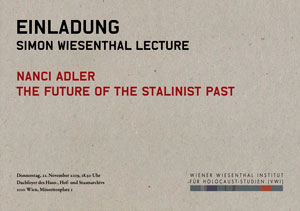Simon Wiesenthal Lectures
Die regelmäßig, alle sechs bis acht Wochen stattfindende Vortragsreihe, setzt sich zum Ziel, mithilfe renommierter Wissenschaftlerinnen und Wissenschaftler die aktuellsten Forschungsergebnisse zum Holocaust sowohl einem Fach- als auch einem breiteren Publikum zu präsentieren – und dabei das beeindruckende Spektrum dieser Disziplin, die zahlreichen Frage- und Problemstellungen von der empirisch-analytischen Historiografie bis zu kulturwissenschaftlichen Themen, jüngere Forscherinnen und Forscher ebenso wie bereits arrivierte, zu berücksichtigen.
Die Vortragsreihe der Simon Wiesenthal Lectures hat sich seit 2007, noch in der Aufbauphase des Wiener Wiesenthal Instituts für Holocaust-Studien (VWI), damals in Zusammenarbeit mit dem Dokumentationsarchiv des österreichischen Widerstandes und dem Institut für Zeitgeschichte der Universität Wien, als tragendes Element der Vermittlung neuerer wissenschaftlicher Ergebnisse im Bereich der Holocaustforschung bzw. der Holocaust- und Genozid-Studien zum Flaggschiff der Vermittlungstätigkeit des VWI entwickelt.
Über ein Jahrzehnt bot das Österreichischen Staatsarchiv im Dachfoyer des Haus-, Hof- und Staatsarchivs großzügigerweise den Simon Wiesenthal Lectures Obhut. Während den herausfordernden Jahren der Pandemie wurden die Lectures online abgehalten. Ab Herbst 2022, um weitere Publikumsgruppen zu erschließen, konnte mit dem Wien Museum eine neue Kooperationspartner gewonnen werden. Bis zur Wiedereröffnung des Hauptstandortes am Karlsplatz werden die SWL im MUSA, Felderstraße 6-8, neben dem Wiener Rathaus stattfinden.
| Simon Wiesenthal Lecture | |||
| Nanci Adler: The Future of the Stalinist Past | |||
Donnerstag, 21. November 2019, 18:30 - 20:00 Dachfoyer des Haus-, Hof- und Staatsarchivs, 1010 Wien, Minoritenplatz 1
|
|||
What are the prospects for reconciliation when the state denies, ignores, or co-opts a history of repression? Thirty years after the end of a dictatorship that claimed millions of victims, aside from symbolic reparations, the post-Soviet government(s) have implemented little of the institutionalised transitional justice mechanisms to reckon with this past. There has been a persistent, politically-driven effort to manage national and public memory by repressing, controlling, or even co-opting the memory of repression. Now, as under Khrushchev and Gorbachev, the government sanctions the immortalisation of victims, but draws a thick line when it comes to the discussion of the perpetrators. Not one henchman has been tried, nor one truth commission instigated, victim compensation is limited, as is archival access, the record in history textbooks is a political narrative, and researchers of Stalinism are once again harassed on spurious charges. It was not until 2015 that the state sanctioned the plan for an offcial monument to the victims of Stalinism. Most of them did not live to see it erected. This lecture will focus on some of the causes and consequences of post-Soviet Russia’s ambivalent attitude toward its Stalinist past, and reflect on how to move beyond current impasses. Nanci Adler is Professor of Memory, History, and Transitional Justice at the University of Amsterdam and Programme Director at the Institute for War, Holocaust, and Genocide Studies (NIOD). She has authored and/or edited, among others, Keeping Faith with the Party. Communist Believers Return from the Gulag (2012), The Gulag Survivor. Beyond the Soviet System (2002), Victims of Soviet Terror. The Story of the Memorial Movement (1993), and Understanding the Age of Transitional Justice. Crimes, Courts, Commissions, and Chronicling (2018). Her research focuses on transitional justice and the legacy of communism. Mit der Teilnahme an dieser Veranstaltung stimmen Sie der Veröffentlichung von Fotos, Video- und Audioaufzeichnungen, die im Rahmen der Veranstaltungen entstehen, zu. |
|||







